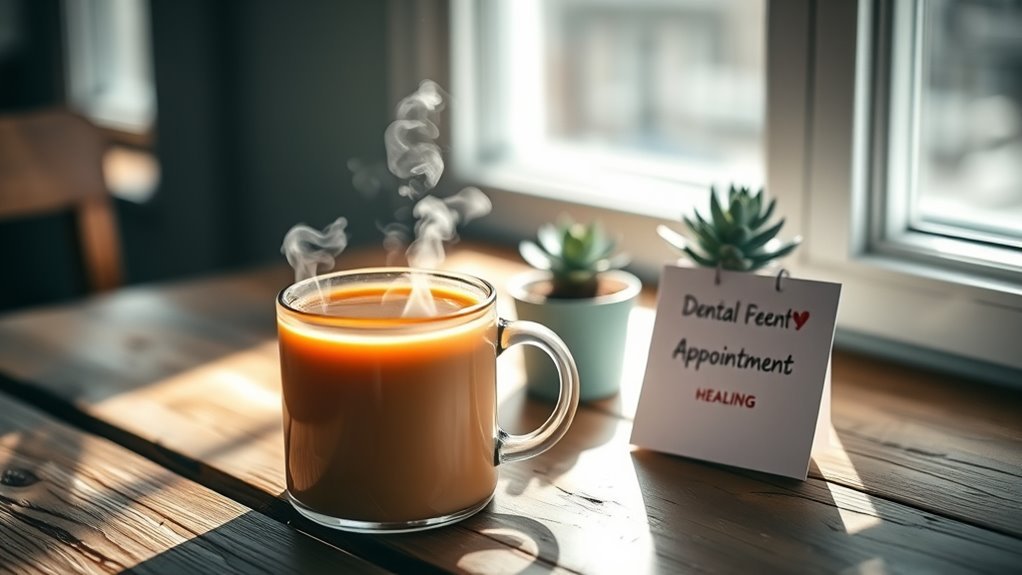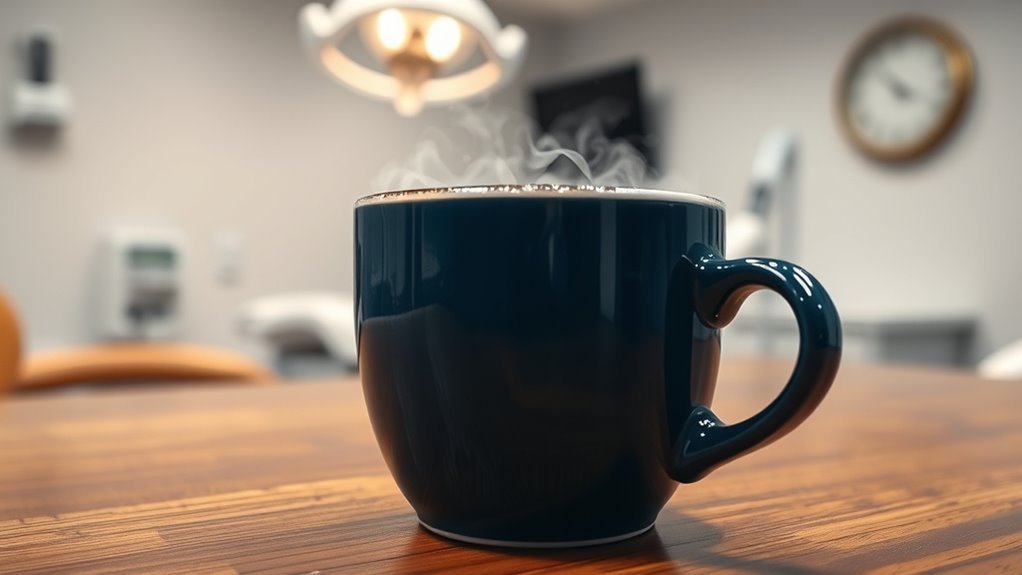Can I Drink Hot Coffee After a Tooth Extraction
After a tooth extraction, it’s best to wait at least 24 to 48 hours before consuming hot coffee. Hot beverages can disrupt blood clot formation and increase swelling, risking complications like dry socket. Instead, opt for lukewarm or cold alternatives during the initial recovery phase. Following your dentist’s post-operative instructions is essential for healing. If you’re curious about other safe beverage options and tips for your recovery, there’s more information available.
Understanding Tooth Extraction and Healing

When you undergo a tooth extraction, it is vital to understand the healing process that follows. The tooth extraction recovery generally begins immediately after the procedure, with the first 24 hours being critical for clot formation. During this initial phase, you should avoid disturbing the extraction site. The healing timeline typically spans a few weeks, with significant tissue recovery occurring within the first week. Mild discomfort and swelling are common but should gradually diminish. It is important to adhere to post-operative care instructions provided by your dentist to promote ideal healing. This includes managing pain, maintaining oral hygiene, and avoiding certain foods and activities that may impede your recovery. Understanding this process empowers you to navigate your healing journey effectively.
The Impact of Heat on the Healing Process
Following a tooth extraction, the application of heat can greatly influence the healing process. While you might think heat application is beneficial, it’s important to be cautious. Heat can promote blood circulation, which may initially seem advantageous for healing benefits. However, applying heat too soon can lead to increased swelling and discomfort, hindering your recovery. The body’s inflammatory response is essential in the early stages, and excessive heat can disrupt this balance. It’s crucial to allow your body to naturally initiate the healing process without external heat sources. Prioritize gentle care, follow your dentist’s instructions, and opt for room temperature or cool fluids initially, ensuring a smoother recovery while you navigate your healing journey.
Why Hot Beverages Can Be Problematic

Hot beverages can pose several risks after a tooth extraction. The heat can increase sensitivity in the affected area, potentially causing discomfort. Additionally, it may disrupt the formation of blood clots essential for proper healing.
Heat Sensitivity Risks
Although many people enjoy sipping on hot beverages, consuming them shortly after a tooth extraction can pose significant heat sensitivity risks. Your mouth is often sensitive post-procedure, and introducing high temperatures can exacerbate dental discomfort. Here are some factors to evaluate:
- Increased pain: Hot beverages can heighten sensitivity, leading to sharp pain in the extraction site.
- Delayed healing: Heat may interfere with the body’s natural healing process, prolonging recovery.
- Burn risk: With reduced sensation, you might not gauge the temperature correctly, risking burns.
It’s essential to prioritize your comfort and healing. Opt for lukewarm or room-temperature drinks instead to minimize heat sensitivity and promote a smoother recovery.
Blood Clot Displacement
Consuming hot beverages after a tooth extraction can lead to the displacement of the blood clot that forms at the extraction site. This clot is vital for proper healing, and if it’s dislodged, it can result in complications like dry socket. Understanding the risks associated with hot drinks can help you make informed choices during your recovery.
| Risk Factor | Description |
|---|---|
| Blood Clot Formation | A protective barrier for healing |
| Displacement Risks | Increased chance of dry socket if dislodged |
| Temperature Impact | Heat can weaken the clot’s stability |
| Drinking Technique | Sipping slowly minimizes risk |
| Recovery Time | Wait at least 24 hours before consuming hot drinks |
Prioritizing your healing guarantees a smoother recovery process.
Tissue Healing Considerations
After a tooth extraction, the healing of soft tissue is essential for recovery, and the introduction of hot beverages can interfere with this process. Consuming hot drinks may disrupt tissue regeneration and delay your healing timeline. Here are a few reasons to reconsider:
- Increased Pain: Hot beverages can irritate the extraction site, causing unnecessary discomfort.
- Risk of Infection: Heat may exacerbate inflammation, making the area more susceptible to infection.
- Slowed Recovery: Hot liquids can impede the formation of a protective clot, prolonging your healing timeline.
To guarantee the best tissue healing, it’s best to avoid hot coffee and other beverages until you’re fully recovered. Prioritize your recovery to enjoy your favorite drinks again without complications.
Recommended Waiting Period Before Consuming Hot Drinks

While it might be tempting to enjoy a hot cup of coffee soon after a tooth extraction, it’s important to wait a bit to avoid complications. Generally, a waiting period of at least 24 to 48 hours is recommended before consuming hot drinks. This timeframe allows your body to initiate the healing process and reduces the risk of dislodging the blood clot in the extraction site. Hot beverages can increase blood flow to the area, potentially leading to increased swelling or bleeding. It’s vital to prioritize your healing and follow your dentist’s post-operative care instructions. By being patient, you can guarantee a smoother recovery and minimize the chance of complications related to consuming hot drinks too soon.
Alternatives to Hot Coffee After Extraction
If you’re seeking alternatives to hot coffee after a tooth extraction, there are several safe options to weigh that can still provide comfort and satisfaction. Consider these alternative beverages:
- Cold Coffee: Brewed coffee chilled or blended with ice offers a revitalizing taste without the heat.
- Herbal Tea: Opt for caffeine-free herbal varieties served warm or cold, promoting relaxation and hydration.
- Smoothies: Blend fruits with yogurt or milk for a nutritious, cool option that’s easy to consume.
These alternatives not only satisfy your cravings but also minimize irritation to your extraction site. Always verify that your choices are at a safe temperature to promote healing and avoid any complications.
Importance of Following Dentist’s Post-Operative Instructions

Following your dentist’s post-operative instructions is essential for ensuring a smooth recovery after a tooth extraction. Adhering to these guidelines is important for effective post-operative care, as they help minimize discomfort and reduce the risk of complications. Your dentist knows what your mouth needs to heal properly, and ignoring their advice can lead to unnecessary issues. Patient compliance with these instructions, such as avoiding hot beverages and certain foods, allows your body to focus on healing without interference. This adherence not only promotes faster recovery but also helps maintain your overall oral health. Remember, you have the freedom to manage your recovery effectively, and following your dentist’s guidance is a critical step in that process.
Signs of Complications to Watch For
After a tooth extraction, it’s essential to monitor your recovery for any signs of complications. Increased pain levels, unusual swelling or bleeding, and a foul taste or odor can indicate issues that may require immediate attention. If you experience any of these symptoms, contact your dentist promptly for further evaluation.
Increased Pain Levels
While some discomfort is expected after a tooth extraction, increased pain levels can indicate complications that require prompt attention. It’s crucial to monitor your pain and seek advice when necessary. Effective pain management and discomfort relief strategies are important for your recovery.
- Persistent or worsening pain despite following prescribed pain management protocols
- Sharp, localized pain that feels different from the initial extraction discomfort
- Pain that radiates to adjacent areas, such as the jaw or ear
If you notice any of these signs, don’t hesitate to contact your dentist. Timely intervention can prevent further complications and facilitate a smoother recovery process, allowing you to enjoy your freedom from dental issues sooner.
Unusual Swelling or Bleeding
Although some swelling and minor bleeding are normal after a tooth extraction, unusual swelling or excessive bleeding can signal complications that require immediate attention. If you notice significant swelling that doesn’t improve within a few days, or if bleeding persists despite following your dentist’s aftercare instructions, it’s essential to consult a healthcare professional. These unusual symptoms may indicate infection or other issues that could hinder your recovery. Effective swelling management includes using ice packs and keeping your head elevated, but if these measures don’t alleviate your symptoms, don’t hesitate to seek help. Remember, being proactive about your health guarantees a smoother recovery and helps avoid further complications after your dental procedure.
Foul Taste or Odor
If you notice a foul taste or odor coming from the extraction site, it could signal an underlying complication that requires prompt attention. This may indicate issues such as infection or dry socket, which can lead to further complications if left untreated. Be vigilant about any of the following signs:
- Persistent foul breath that doesn’t improve
- Noticeable taste disruption in your mouth
- Pain or discomfort that intensifies over time
These symptoms can affect your recovery and overall well-being. If you experience any of them, contact your dentist or oral surgeon immediately. Early intervention is vital to guarantee proper healing and avoid more serious complications. Your health and comfort should always be a top priority.
Tips for Enjoying Your Coffee Safely Post-Surgery
After a tooth extraction, it’s crucial to approach your post-surgery coffee consumption with caution to guarantee proper healing. Here are some recovery tips to help you enjoy your coffee safely:
| Tip | Details |
|---|---|
| Wait 24 Hours | Allow your body to start healing first. |
| Choose Cool Temperatures | Opt for lukewarm coffee to prevent irritation. |
| Monitor Pain Levels | If you experience discomfort, reconsider intake. |
| Explore Coffee Alternatives | Consider herbal teas or decaf options. |
| Stay Hydrated | Drink plenty of water to maintain hydration. |
Following these guidelines can help you relive your coffee ritual while prioritizing your recovery. Always consult your dentist for personalized advice tailored to your situation.
Personalizing Your Recovery Experience

While your recovery from a tooth extraction is individualized, personalizing your experience can greatly enhance your comfort and healing process. Consider integrating your personal preferences and establishing recovery habits that suit your lifestyle. Here are some ways to tailor your recovery:
Personalizing your recovery after a tooth extraction can significantly improve your comfort and promote healing.
- Diet Choices: Opt for soft foods that are easier to eat and won’t disturb the extraction site.
- Pain Management: Choose between over-the-counter pain relief or prescribed medication based on what works best for you.
- Resting Environment: Create a comfortable space with minimal distractions to promote relaxation and healing.
Frequently Asked Questions
Can I Drink Iced Coffee Instead of Hot Coffee After Extraction?
You can enjoy iced coffee after a tooth extraction, but be mindful of your temperature sensitivity. Cold beverages might provide relief and reduce swelling, making them a suitable choice. However, make certain that your iced coffee isn’t too sweet or acidic, as these can irritate your healing gums. Always listen to your body, and if you experience discomfort, it’s wise to consult your dentist for personalized advice on your recovery.
How Long Should I Wait Before Drinking Any Coffee After Surgery?
After surgery, it’s crucial to follow specific beverage temperature guidelines. Generally, you should wait at least 24 hours before consuming hot beverages, including coffee, to avoid irritation and promote healing. During this post extraction timeline, stick to lukewarm or cool drinks to minimize discomfort. Always prioritize your recovery, and if you’re unsure, consult your dentist for personalized recommendations. Remember, your comfort and health come first after any procedure.
Can Caffeine Affect My Healing Process Post-Extraction?
Caffeine can indeed affect your healing timeline post-extraction. It may lead to increased blood pressure and heart rate, potentially complicating your recovery. Additionally, caffeine can cause dehydration, which isn’t ideal when you’re trying to heal. It’s best to limit your caffeine intake during the initial healing phase to support a smoother recovery. Always consult your dentist for personalized advice tailored to your specific situation and healing needs.
What if I Accidentally Drink Hot Coffee Too Soon?
If you accidentally drink hot coffee too soon after your extraction, you might experience increased discomfort or pain that can interfere with your healing. The heat can irritate the surgical site, potentially complicating your pain management strategies. It’s essential to monitor how you feel afterward; if you notice any significant pain or swelling, consult your dentist. Proper care and awareness will help guarantee smoother extraction healing and prevent unnecessary setbacks.
Are There Any Other Beverages I Should Avoid After Extraction?
After a tooth extraction, you’ll want to be cautious about what you drink. Imagine sipping a fizzy soft drink; the bubbles might sting your healing socket, potentially causing discomfort. Alcoholic beverages can also hinder your recovery, as they can interfere with medications and slow healing. Stick to water or herbal teas for the first few days to promote healing and avoid complications. Your body deserves the best care during this recovery period.






